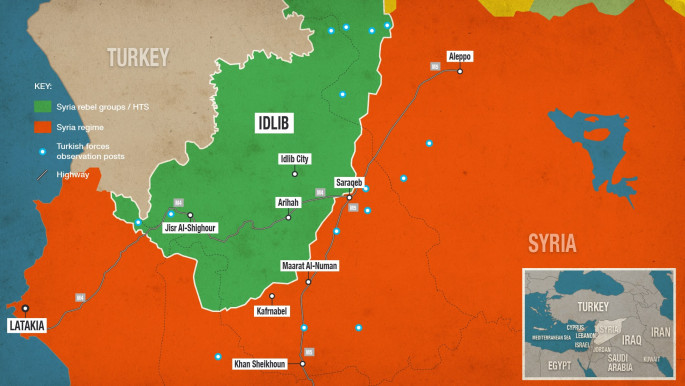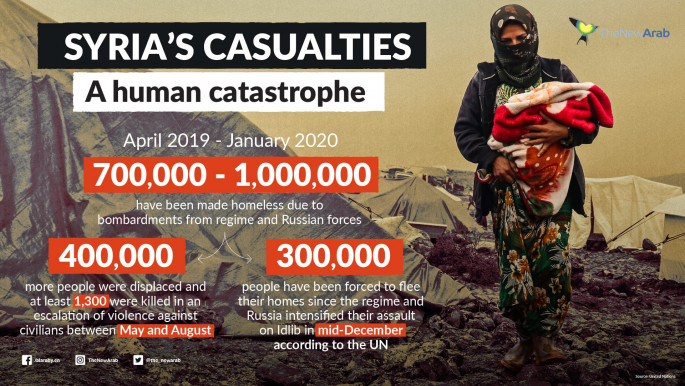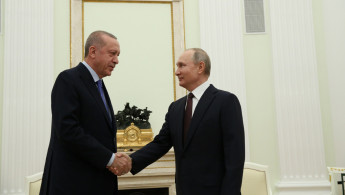Turkey, Russia agree Syria ceasefire from midnight: Erdogan
Turkey and Russia reached agreement on a ceasefire in Syria's northwestern Idlib province to take effect at midnight, Turkish President Recep Tayyip Erdogan said Thursday.
"At 00.01 tonight, as in, from midnight, the ceasefire will be put in place," Erdogan said, following talks with his counterpart Vladimir Putin in Moscow.
The leaders of Turkey and Russia sat down on Thursday for talks in Moscow aimed at ending hostilities in northwestern Syria involving their forces and the Syrian regime and opposition.The fighting could have potentially pit Turkey and Russia against each other in a direct military conflict.
Both leaders underlined the need to reach an agreement at the start of the Kremlin talks.
Russian President Vladimir Putin said the situation in Idlib had become so tense that it was time for "a direct personal conversation" between them.
His Turkish counterpart Erdogan also voiced hope for finding a settlement and pointed at blossoming Russia-Turkey trade.
"The entire world has its eyes fixed on us," Erdogan said at the start of the talks, stressing that decisions were needed to "calm the region and our two countries".
The talks happened on the same day that Russian airstrikes killed 16 displaced Syrians sheltering at a poultry farm in Maarat Misreen in Idlib province.
Up until the latest crisis in Idlib, Putin and Erdogan had managed to coordinate their interests in Syria. Moscow's support for Syrian President Bashar Al-Assad's regime pits it against Ankara, which has provided limited support to the Syrian rebels throughout the nine-year conflict.
Both Russia and Turkey appear eager to avoid a showdown , but their sharply conflicting interests in Idlib province will make it difficult to negotiate a mutually acceptable compromise.
A brutal Russian-backed regime offensive to gain control Idlib - the last opposition-held region in the country - has resulted in Turkey sending thousands of troops into Idlib to repel the regime army. Approximately 800 civilians have been killed in the campaign, and nearly a million more displaced.
Erdogan has responded by opening Turkey's gateway to Europe in an apparent bid to persuade the West to offer more support to Ankara.
Comment: Erdogan and Putin will remain forever 'frenemies'
Turkey also said that it had "neutralised" 184 regime troops while destroying regime tanks and other military equipment. Russia, which has helped Assad reclaim most of the country's territory, has signaled it won't sit by to Turkey's activities.
On Thursday, Putin offered his condolences to Erdogan over the deaths of 33 Turkish troops in a regime airstrike last week, but noted that regime troops also suffered heavy losses. Another Turkish soldier was killed in an attack in Idlib on Thursday, raising the number of Turkish soldiers killed since the beginning of February to 59.
'The world's eyes are on us'
"We need to discuss the situation to prevent any such incidents and also not to damage Russia-Turkey relations that we cherish," the Russian leader said.
Erdogan said: "The steps we will take, the right decisions we will take here today will help ease [concerns in] the region and our countries."
After Turkey had downed several regime jets, Moscow warned Ankara that its aircraft would be unsafe if they enter Syrian airspace - a veiled threat to engage Russian military assets in Syria.
The fighting in Idlib is the most severe test of Russia-Turkey ties since the crisis triggered by Turkey's downing of a Russian warplane near the Syrian border in November 2015.
Russia responded with an array of sweeping economic sanctions, cutting the flow of its tourists to Turkey and banning most Turkish exports - a punishment that eventually forced Turkey to apologise.
Although it seems Turkey can't afford a replay of that costly crisis, Moscow needs Ankara as a partner in a Syrian settlement and Russia's supply routes for its forces in Syria lie through the Turkish Straits.
Allies or rivals?
Moscow also hopes to use Ankara in its standoff with the West. Last year, Turkey became the first NATO country to take delivery of sophisticated Russian air defence missile systems, angering the United States. Turkey has put its deployment on hold, however, amid the crisis in Idlib.
The talks in Moscow will mark the 10th encounter in just over a year between Putin and Erdogan, who call each other "dear friend" and have polished a fine art of bargaining.
Last October, they reached an agreement to deploy their forces across Syria's northeastern border to fill the void left by President Donald Trump's abrupt withdrawal of US forces. Prior to that they had negotiated a 2018 agreement that confirmed Idlib’s status as a "de-escalation zone".
However, in April 2019, Russia and the Syrian regime violated the deal, launching an attack on Idlib province which killed thousands of people and displaced hundreds of thousands more.
At the end of 2016, Russia, Turkey, the Syrian opposition and the regime agreed to establish four de-escalation zones in Syria but the regime and Russia later overran three of them, leaving Idlib as the last area in Syria to be held by anti-Assad rebels.
Comment: As the stakes rise ever higher in Syria, refugees pay the price
A possible compromise on Idlib could see Assad retain control over the key M5 highway, which his forces claimed in the latest offensive. The road that spans Syria linking the political capital Damascus with Aleppo, the country's main commercial centre, is essential for Assad to consolidate his rule.
In a sign earlier this week that the Kremlin firmly intends to secure control of the M5, Russian military police were deployed to the strategic town of Saraqeb, sitting on the highway, to ward off any Turkish attempt to retake it.
In return, Putin could accept the presence of Turkey-backed rebels in the areas alongside the border and put brakes for now on Assad's attempts to claim full control over Idlib.





 Follow the Middle East's top stories in English at The New Arab on Google News
Follow the Middle East's top stories in English at The New Arab on Google News


